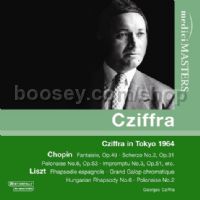Cziffra In Tokyo 1964 (Medici Masters Audio CD)
Cziffra In Tokyo 1964 (Medici Masters Audio CD)
Special Offer
* Estimated price converted from UK retail price
'Cziffra in Tokyo 1964'
Chopin: Fantaisie Op.49 / Scherzo No.2 Op.31 / Waltz Op.18 / Waltz Op.34/3 / Impromptu No.3 Op.51 / Ballade No.4 Op.52 / Polonaise No.6 Op.53
Liszt: Rhapsodie Espagnole / Polonaise No.2 / Grand Galop chromatique / Hungarian Rhapsody No.6
Recording: Tokyo, 23 April 1964
Gyorgy (Georges) Cziffra (1921-1994) was a child prodigy, a phenomenal pianist, born into poverty in Budapest before adopting French citizenship having escaped from his Soviet-dominated homeland in 1956 after enduring deprivation, hard labour and imprisonment. In a breathtaking career, Cziffra achieved almost iconic status but at the same time remained a controversial figure. After the tragic death of his son, Gyorgy Junior, in 1981, Cziffra's life changed and he was never quite the same man again. Cziffra died in 1994 leaving the Cziffra Foundation at Senlis devoted to helping young pianists.
'Greater than Horowitz, he combines the precision of a metronome with the electrical discharge of a thunderstorm' are some of the quotes describing his pianism. His Liszt produced a near hysterical reaction where he found an ideal outlet for his hair-raising pianism while his Chopin was highly individual and controversial.
The Tokyo recital from 1964 represents a very high point in his playing capturing the early Cziffra at his mercurial best. He had only started his career in 1956 and by 1964 was totally international. The tapes have been sourced from the Cziffra Foundation.
"Judging from recordings of live concerts, the stimulation of an audience spurred Cziffra to reach for his limits and beyond; the pianist repeatedly demonstrated some of the most daring risk-taking in musical history. The 1964 live Tokyo recording contains unimaginable renditions of Liszt's Hungarian Rhapsody n°6 and Grand Galop chromatique, for example. The palpable electricity and generosity of his playing, reflecting the warmth and kindness of the man, were the sources of his public adulation" Pierre-Martin Juban writing in the International Piano Quarterly.




